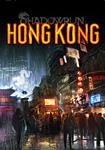
Shadowrun: Hong Kong - Review @ Kill Screen
Zach Hines (Kill Screen Daily) reviewed Shadowrun: Hong Kong:
All cyberpunk heads to Hong Kong eventually. Shadowrun does it right
Asia is so often the dream of a cyberpunk future. Neon-soaked skyscraper canyons, and an abrasive mix of high and low tech, of the ultra-rich and the ultra-poor—these are the things that cyberpunk is made of.
But all too often, the essence of the place fades into a backdrop of the story at hand. Ridley Scott’s take on the Los Angeles of Blade Runner is a thinly veiled Hong Kong, but this serves as little more than visual shorthand for futuristic grittiness—at best, it’s an instant noodle signifier of mood in an otherwise more typical LA noir story.
This is true of many cyberpunk works that snatch a little Asia to add flair. In the 2000 videogame Deus Ex, a significant part of the middle third takes place in Hong Kong. Though the game reaches for the headier themes of cyberpunk, such as transhumanism and the atomization of identity, it fails to tap into the rich vein of this stuff that’s at your disposal when you decide to travel to Asia; instead, it focuses on the most obvious visual cues as little more than exotic window dressing.
Indeed, “Asian-ness” has become a trope of cyberpunk so deeply ingrained it borders on cliché. All of this stems from the genre’s coming of age in the 80s, when authors were writing against the backdrop of Japan’s rapid technological and economic boom, and artists were left gobsmacked by the majestic violence of 1988’s Akira. When William Gibson created Chiba-City in Neuromancer, he was putting down ley lines that continue to shape the genre to this day, but which have so far gone largely untapped.[...]
The actual shadowrunning is no great evolution on the tried-and-true formula of the past two Shadowrun games (though it has improved its hacking minigame with a system swiped from the ‘80s pass-it-along-game Simon). This is a shame when it comes to creakier systems in dire need of updating, such as the counterintuitive inventory management, and the lack of briefing menus when you take on a mission. The turn-based combat remains deliberative and solid, despite wonky stabs at systems the engine is simply not built for, such as stealth. And for all its smart writing, the pacing becomes dull after the first act, when you are basically forced to wait for someone else to deliver the climax to you on a plate.
These are quibbles. Shadowrun Hong Kong’s success boils down to a smart early decision to stay true to Hong Kong, and exaggerate the flaws of the city’s bizarre governing philosophy to find a new, urgent relevance in the cyberpunk genre. As a long-term resident of the city myself, I found that as the central mystery started to resolve into a corrupt state-sanctioned housing scam that enriched a family-run business at the expense of the ultra-poor, I started to cringe; it was too close to the bone. Setting aside the orcs, elves, and Chinese demons, Shadowrun Hong Kong taps directly into one of Asia’s driving economies to deliver a startlingly clear vision of our cyberpunk future: one where we are all merely economic units on a corporate spreadsheet—to be compounded or deleted at the whims of an anonymous board of directors.
Score: 75%
Information about
Shadowrun: Hong KongSP/MP: Single-player
Setting: Technofantasy
Genre: RPG
Platform: PC
Release: Released

